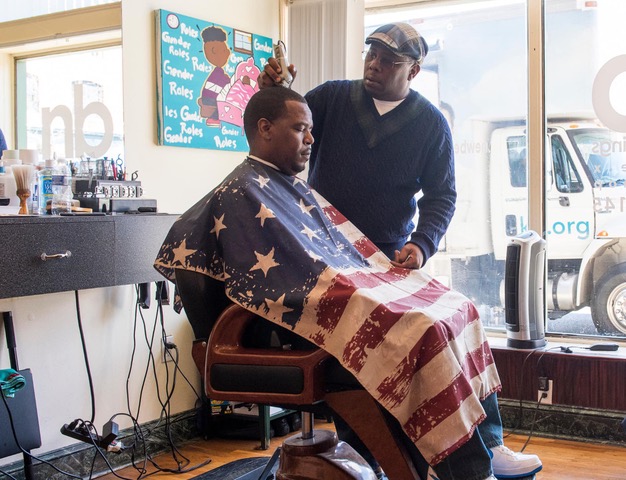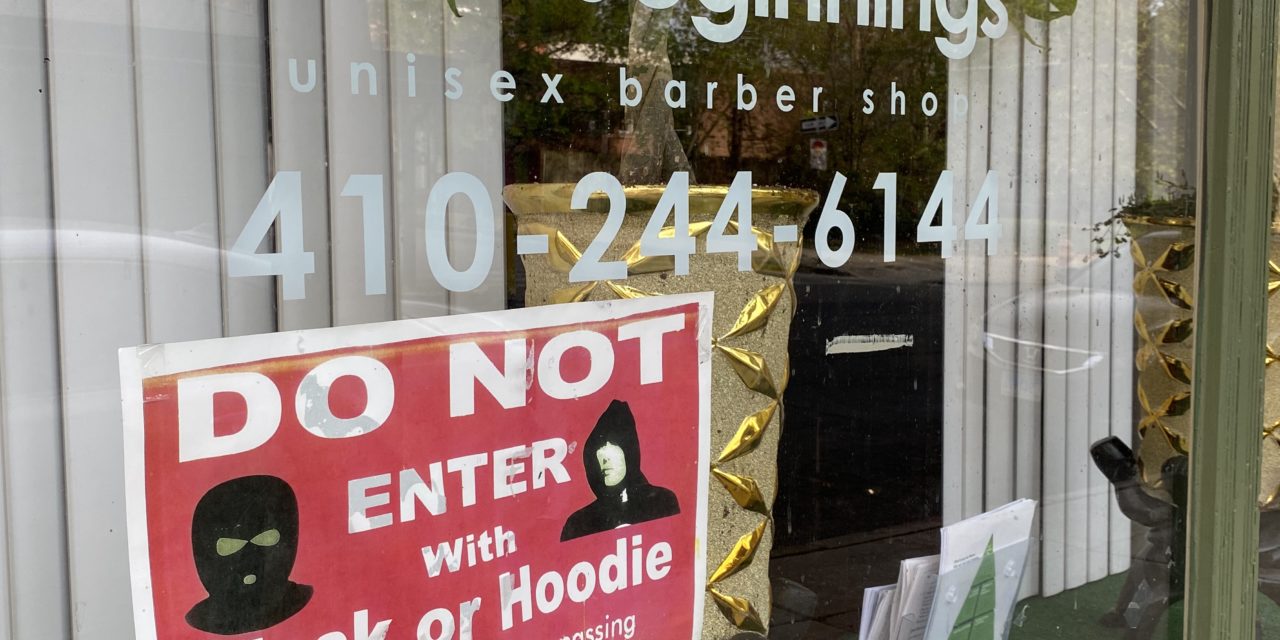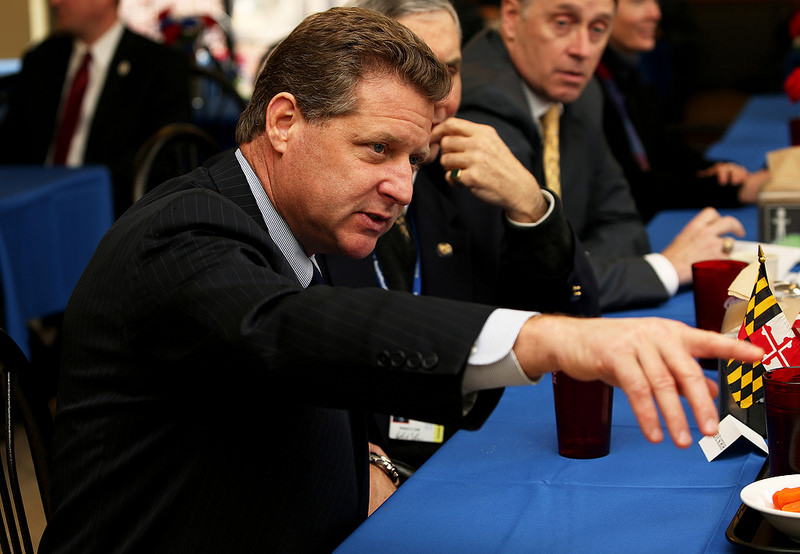By Kaanita Iyer, Jason Fontelieu and Jamal Williams
BALTIMORE—In most barbershops, you might find posters that show style trends or magazines stacked on tables. But in New Beginnings barbershop, what stands out are student artwork on the walls and stacks of pamphlets promoting art exhibits and health screenings.
New Beginnings is not just a place for a trim. It’s also a place where you can address health concerns and trauma that stem from violence in Baltimore.
“I had to start doing things to address the issue of senseless violence, starting with myself, as well as others, that brought forth the urgency to unite barbers and beauticians with much more depth,” New Beginnings owner Troy Staton said.
The barbershop, in southwest Baltimore’s Hollins Market neighborhood, offers blood pressure checks, HIV testing and flu shots, among other health-related services. They do this with the support of Kaiser Permanente.
“Barbershops and salons have a long history of being places where folks feel safe in discussing needs and wants, and almost like counseling,” said Alma Roberts, Kaiser Permanente’s interim director for community health for Greater Baltimore. “They’re considered anchor organizations in their communities and have access to the trust of their clients.”
Kaiser partnered with New Beginnings in 2016 to bring health services to the shop. Such alliances often forge relationships with clients that doctors cannot, because they are built on instinctive trust.
“There are only so many people you let get close to you, like really close to you,” said Stephen B. Thomas, a health policy and management professor at the University of Maryland’s School of Public Health in College Park.
Thomas leads a team of researchers in the Health Advocates In-Reach and Research (HAIR) campaign. The group is working to mirror the barbershop alliances in Baltimore by building a network of Prince George’s County barbershops and beauty salons to promote public health there.
“Automatically, by the virtue of what (barbers) do, you have to let down your shields to let someone touch you…,” Thomas said. “And I think when physicians see some of this, they’re envious of the relationship the barbers have with their clients.”
Kaiser has expanded to work with six other barbershops and hair salons in West Baltimore. Three are partner shops, meaning they have health-related trainings in the shops, as well as access to Kaiser’s mobile unit, where the shops’ customers can be screened. The other three businesses are ambassador shops, which don’t offer screenings in the Kaiser mobile unit but do participate in all other activities, Roberts said.
Roberts said the partnership has offered medical screenings and other medical assistance to about 5,000 Baltimoreans since 2016. Kaiser also provides classes and workshops, including weekly wellness and fitness classes and monthly mental health workshops. Kaiser works in collaboration with organizations such as the Black Mental Health Alliance and gymGO.
In addition to health screenings, Kaiser trains its partners in managing issues such as mental health, diabetes and chronic diseases. All of its partners and ambassadors are certified in Mental Health First Aid, a national program that teaches how to recognize and respond to mental illness and substance abuse.
Emotional connections often are made inside barbershops, and Hollins Market barbers fill a huge need. In 2018, the Hollins Market neighborhood ranked fourth-highest in the city in gun-related homicides, fifth-highest in shootings and fourth-highest for the number of narcotics calls for service per 1,000 residents, according to data compiled by the Baltimore Neighborhood Indicators Alliance.
New Beginnings fell victim to such violence when the shop was shot up on Halloween in 2018. Staton suffered a wound to the neck. A bullet lodged into the wall next to his barber station. The bullet hole is still there.

Troy Staton heads a network of barbers and beauticians helping clients cope with trauma in Baltimore in May 2020. He owns New Beginnings barbershop in Baltimore’s Hollins Market neighborhood. (Photo courtesy Troy Staton)
“I keep that there as a reminder to never take nothing for granted,” Staton said. “I could’ve simply patched it up, but then it’d be gone. And I needed to remember how simple things could change at any given moment.”
City Councilman John Bullock said Hollins Market “is still a neighborhood that adds a significant amount of vitality, even compared to some of the neighborhoods that are in close proximity.” New Beginnings is in Bullock’s district. He’s been a client there for nearly seven years. He said he has observed how therapeutic a haircut can be for customers because barbershops are “safe forums to tell our stories.”
That sharing works both ways. Staton is in therapy for post-traumatic stress following the shooting at his shop. His openness to treatment helps defy the stigma against mental illness in the African American community, which Mia Smith-Bynum, a family science associate professor at the University of Maryland’s School of Public Health, describes as “pretty pronounced.”
“With all the negative stereotypes aimed at African Americans, you layer mental health issues on top of it … it’s just one more thing that can be used as a weapon to dehumanize African Americans or to diminish them,” Smith-Bynum said. “That’s where the stigma comes from.”
Donna Bruce, a beautician in the Baltimore area for almost 35 years, sees it regularly. “Nobody talks about stress, about mental health … because of the stigma … you put on your big girl panties and move on,” she said.
Bruce said being a hairstylist, for her, is much more than doing hair –– she’s also a peer recovery specialist certified by the state of Maryland, specializing in helping with family-related issues.
She has an arsenal of resources ready to suggest, such as TurnAround Inc., for survivors of sexual violence or Dee’s Place for people in recovery.
But she said there are times when listening to her clients’ stories takes a toll on her.
“Some people bring a lot of baggage to the table, and that’s secondary stress that I didn’t even know that I was taking on until I started taking some social work classes” at the University of Maryland School of Social Work, Bruce said. “I didn’t know I was affected by that.”
Even so, Bruce has built strong relationships with her clients. She talks to them about a variety of issues — from everyday gossip to addiction and mental health.
“I’m everybody’s mother,” she said. “I’m Ma, I’m Aunty … They consider me a family member.”
Staton has also found family among his clients and people who live in the neighborhood. Marie Snipe chose him to be her son’s godfather.
Snipe said she met Staton in 1993 when he worked in a shop a few blocks away and she needed help raising her children.
“I felt guilty because of my past — me using (drugs) and not being there” for her children, Snipe said. “But I always told them, no matter what, if anything were to happen to me, they always could go to the barbershop.”
Staton had food and diapers for her children, and he looked out for other members of the community by offering rides and pitching in to cover bills, Snipe said.
Today, Snipe is a substance abuse counselor. She works as a liaison to connect Staton’s clients with resources they might need to combat their own addictions.
The barbershop “was a place to go where you needed help, resources, anything they can help you with. They never turn their back on you or judge you for anything,” she said.
Snipe’s son, Davon Mayo, like many other kids in the neighborhood, helped around Staton’s shop by sweeping and cleaning. He was “always connected to the barbershop,” Snipe said. Mayo died of a gunshot wound to the head in southwest Baltimore in April 2019. He was 25 years old.
For Staton, it’s clear what his shop, and other barbershops, symbolize.
“They are the heartbeat and the pulse of the community.”






Recent Comments